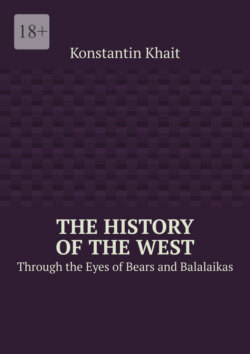Читать книгу The History of the West. Through the Eyes of Bears and Balalaikas - - Страница 3
Introduction. How to and How Not to Study History
ОглавлениеThe study of history is not the study of facts; facts in themselves have no value: all these events – wars, uprisings, discoveries, and catastrophes – have already occurred, and knowing their details, exact dates, and sequences does not enrich human experience or allow for the systematization of data and drawing conclusions, which is the essence of any science. The study of history is the understanding of the logic of the historical process, the interconnection of events, causes, consequences, and relationships between people, nations, and states. It is generalization, the search for patterns, and ultimately an attempt to use accumulated knowledge for forecasting. We study the past not out of idle curiosity but solely for the ability to predict the future.
The study of history has several adversaries: the incompleteness of sources, often irreplaceable, since not all decisions, actions, and events are documented, and not all documents survive to the present day. Often, when researching a particular historical period, personality, or phenomenon, a historian is forced to rely not on primary sources, but on material already processed by someone else – memoirs, retellings, quotes that often appear many years or even centuries later. Often, one has to turn to the works of predecessors: articles, monographs, translations – hopefully, they are created competently and impartially. However, the incompleteness of sources provokes or, if you will, forces one to fill in the missing parts: cause-and-effect relationships, the logic of the actors, customs, and even events. A theory built on such conjectures serves as a basis for further research, and after some time, it becomes impossible to understand which events and processes actually took place and which are only assumed with varying degrees of justification. Such “the conjecturing of facts” is inevitable for obtaining a complete theory from incomplete data, but a conscientious historian must always be aware of which of their statements have a reliable evidential nature and which are derived through reasoning. And they must disclose the sources of their conclusions as fully as possible.
An even more complex adversary is the politicization of history, the attempt to replace the study of actual phenomena with the proof of one’s own point of view. Like any “fit to answer,” this approach has nothing to do with either science or knowledge, being a form of propaganda, and from a researcher’s perspective, falsification. And no matter how good the intentions, they cannot justify this falsification – it’s impossible to draw correct conclusions from deliberately false arguments invented. Interpretations can form logical chains, but these chains do not correspond to what actually existed. Whether we like it or not, in history, as in any science, there is no concept of good and evil, good and bad; there is truth, that is, everything that actually took place, and falsehood, that is, everything that did not actually occur.
But the most significant enemy of studying history is the anachronism of thinking. We, people of our time, interpret past events through the prism of our own ethics, experiences, knowledge, and culture. We think as the people of the 21st century, who have launched spaceships into the sky, built nuclear power plants, and established, in a significant part of the world, the principles of humanism and some form of democracy. But people of the past, even the recent past, let alone the distant past, thought differently. They had different experiences, different knowledge, different values for their own and others’ lives, and different motivators. It is very difficult, almost impossible, to understand not only a 10th-century Viking, whose short life consisted of drinking, fighting, and rowing, but even a soldier of the First World War, ready to give his life for the personal interests of the Austrian, Prussian, or Russian emperor, who had almost no connection to this soldier. For us, inhabitants of countries where people are more or less equal, at least in words, it is hard to reconcile with the fact that for most of human history, such equality was by no means considered the norm. Gender equality, racial equality, social class equality, the honor of labor, the value of art – all these things seem obvious to us, but in past eras, they could be perceived, be regarded as absurd, blasphemous, and even criminal. And if we want to understand the logic of the historical process and draw justified, practically applicable conclusions from it, we first need to think, or at least try to think, as the people of the studied era did, living by their ethics, morals, stereotypes, and ideas, even if from our current perspective they seem ridiculous and immoral.
